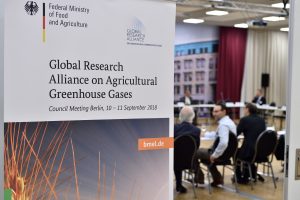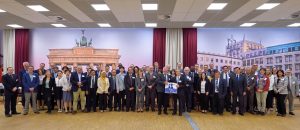Germany’s contribution to the Global Research Alliance
GRA Chair
Germany was the Council Chair of the GRA in 2018/2019 and participates in the following research groups and networks:
- Peatland Management Network
- Animal Health & Greenhouse Gas Emissions Intensity Network
- Croplands Research Group
Germany hosted the eighth annual GRA Council Meeting, which took place in Berlin, from 10-11 September 2018. The previous Council Chair Japan handed over to Germany, and Indonesia accepted the position of Vice-Chair. 31 member countries attended the meeting – alongside several partner organizations and Kenya as an observer country. Essential outcomes of the meeting were the acceptance of two new GRA Flagships – one on Circular Food Systems and the other on Nitrogen. In addition, the GRA agreed to support the UNFCCC Koronivia joint work on agriculture. Furthermore, several upcoming capability building opportunities supported by the GRA and its partners were announced.

The GRA Council Meeting 2018 took place in Berlin, Germany.

Group photo from the Council Meeting.
International Conference on Agricultural GHG Emissions and Food Security 2018
Germany sponsored the International Conference on Agricultural GHG Emissions and Food Security – Connecting Research to Policy and Practice (#AgriGHG) from September 10th- 13th 2018 in Berlin, Germany. The Ministry of Food and Agriculture together with the GRA, the European Joint Programming Initiative on Agriculture, Food Security and Climate Change (FACCE-JPI), the CCGIAR Research Program on Climate Change, Agriculture and Food Security (CCAFS) and the Thünen Institute jointly organized the event. Approximately 300 scientists, stakeholders from politics, administration and the private sector, as well as farmers from over 50 different countries, gathered to discuss the central question:
What are the options and longer term visions to mitigate greenhouse gases and enhance carbon sinks in the agricultural sector while ensuring food security?
The overall objectives of this conference were to:
• Provide an overview of relevant research activities and highlight the need for action to reduce GHG emissions from agriculture and improve carbon sequestration in the context of climate change, sustainable agriculture and food security.
• Facilitate a dialogue among all stakeholders involved (researchers, policymakers, farmer and industry representatives) to identify further mitigation action and research opportunities to be addressed at national, EU and international levels.
• To promote EU and international cooperation in mitigation research.
For the book of abstracts and the final report of the conference click here.
Research Collaborations
Germany supports the Joint Call on “Novel technologies, solutions and systems to reduce the greenhouse gas emissions in animal production systems”.
The Joint Call is a partnership between three European ERA-NET research initiatives on Sustainable Animal Production (SusAn), Monitoring and Mitigation of Greenhouse Gases from Agriculture and Silviculture (ERA-GAS) and Information and Communication Technologies and Robotics for Sustainable Agriculture (ICT-AGRI).
The Joint Call is supported by research partners from 24 countries, including from outside of Europe, participating countries are: Belgium, Chile, Denmark, Estonia, Finland, France, Germany, Greece, Ireland, Italy, Latvia, Lithuania, The Netherlands, New Zealand, Norway, Poland, Romania, Slovakia, Spain, Sweden, Turkey, UK and Uruguay.
The overall objective of the 2018 Joint Call is to contribute to the development of novel technologies, solutions and systems to reduce the GHG intensity of animal production systems (excluding aquaculture or fur animals) in Europe and beyond.
Capability Building
The Thünen Institute, Federal Research Institute for Rural Areas, Forestry and Fisheries, will host two fellows from Cameroon and China who have been awarded a placement in the international scholarship programme CLIFF-GRADS. The programme is designed to support budding agricultural scientists. They receive scientific training and get the opportunity to work on research projects at the host institution.


